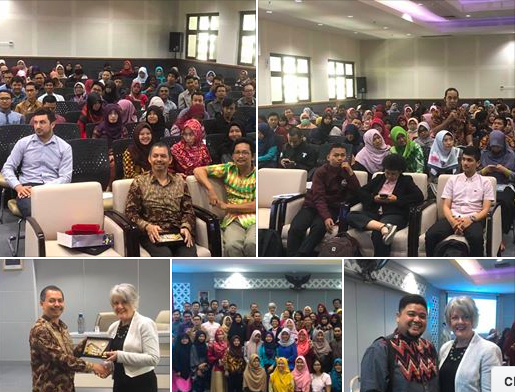You are here
Postgraduate study programs in Instructional Technology present Guest Lectures from Australia
Primary tabs

In order to provide students with insight into the development and use of information technology for learning, the Master of Science Learning Program of PPs UNY invited guest lecturer Dr. Elizabeth Hartnell-Young from the University of Melbourne Australia which was packaged in the form of Guest Lecturing with the topic "New Literacy using Technology and Virtual Space" on Thursday of 11th October 2018. According to the Head of Study Program PPs UNY Prof. Herman Dwi Surjono, Ph.D. the theme in this event is very interesting and important for students in this digital age. This can be seen from the more than 230 students who attended the Hall of the new PPs UNY building on the 7th floor of various study programs in the PPs UNY environment enthusiastically joining the activities until the end.
In the general lecture, Dr. Elizabeth Hartnell-Young said that there is currently a change in a learning paradigm. Learning is a process of constructing knowledge not only as a mere transfer of knowledge. This paradigm shift was triggered by the need for new skills in the 21st century. According to Griffin, McGaw, and Care, (2011), some of the skills needed in the 21st century are the ability of how to think, how to work, the use of appropriate equipment to work, and a way to live in the world. Other skills that need to be mastered are communication skills, problem-solving, critical thinking, collaboration, skills in technology and information, and creativity. These skills cannot be achieved if there is no change in the learning paradigm.
The new skills needed in the 21st century are also closely related to the new literacies that arise in the use of technology and virtual space. New literation that emerged in the 21st century are digital literacy, multi literacies, and information literacy (Coiro, Knobel, Lankshear, & Leu, 2008). Literacy itself refers to the ability of individuals to find, evaluate, produce and communicate clear information through writing and other forms of communication. Literacy is needed in the era of information disclosure as it is today. The use and use of technology that is quite large, especially among the productive age can have a negative impact if not balanced with good literacy. There are many examples of errors or misuse of technology that starts from a low literacy level. Therefore, it is very important to have good literacy in facing the challenges of the information age in the present and the future.
Digital portfolio is one of the changes in perspective in the assessment of student learning to improve new literacy in the information age. Some teachers have adapted this assessment model. Digital portfolio assessment model is an example of the application of the change in perspective in the form of scoring in the form of numbers into an assessment based on student development from time to time. Digital portfolios make it easy for teachers to provide feedback efficiently thanks to technology. Therefore it is very important to improve teacher literacy to be able to utilize technology optimally in the learning process. The main key in facing this challenge is to focus on personal, mobile and collaborative. Finally, teachers must take an important role in student development by involving technology and collaborating locally and globally. (frenki).
PERPUSTAKAAN
KONTAK KAMI
PROGRAM PASCASARJANA
Kampus Karangmalang, Yogyakarta 55281
Telp. +62274-550836 (front office)
Fax. +62274-520326
Website : http://pps.uny.ac.id
Email: pps@uny.ac.id, humas_pps@uny.ac.id
Copyright © 2025,
